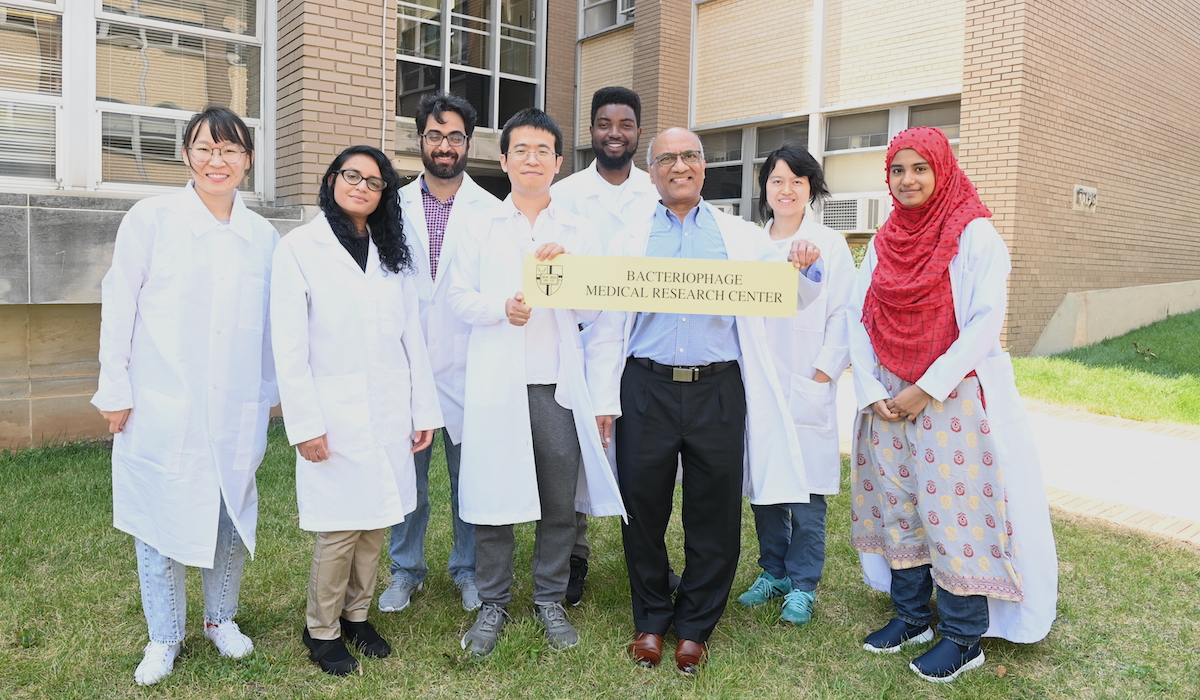

Catholic University Biology Professor Venigalla Rao, Ph.D., was recently installed as a Fellow of the National Academy of Inventors (NAI). He also just published new research on the effectiveness of a nasal T4-based vaccine for COVID-19 in mBio, the flagship journal of the American Society of Microbiology.
Dr. Rao was elected as an NAI Fellow by his peers in recognition of his breakthrough research on biomedical and microbiological technologies over more than three decades.
The National Academy of Inventors is a membership organization of universities, and governmental and non-profit research institutes that is dedicated to recognizing academic inventors and innovators whose work has significantly improved people’s lives.
“The NAI Fellowship award is a significant honor for me, our research team, and the University,” said Rao, who accepted the medal at an induction ceremony held on June 15 at the organization’s annual conference in Phoenix, Ariz.
The fellowship is open to inventors from all academic and research institutions worldwide. Fellows must be a named inventor on U.S. patents; the median patent count is 20. Rao’s groundbreaking research on bacteriophage T4, a virus that he has reconstructed to deliver treatments rather than disease, has provided The Catholic University of America with 24 U.S. and international patents so far.
Many of the University’s patents include graduate students and research fellows from Rao’s lab as co-inventors, unusual recognition in academia, but important for them and for Rao, who believes they “should receive credit for their experiments and creative work.”
Many promising and patented projects are being developed by Rao and his team at Catholic University’s Bacteriophage Medical Research Center, which Rao founded and directs. These include the nasal spray that delivers the bacteriophage T4-COVID vaccine. It is designed to be both pain-free and shelf-stable so it would be easier than current technologies to distribute the vaccine globally. Dr. Rao's vaccine research is funded by National Institute of Allergy and Infectious Diseases (NIAID) and NIH, and his basic research by the National Science Foundation (NSF).
Using a patented production process developed at Catholic University, the vaccine is made by engineering a harmless bacteriophage T4 virus that is tailored to deliver the antidote rather than the disease.
Based on tests conducted in mice by a collaborating team led by Dr. Ashok Chopra (co-corresponding author of the mBio paper) at the University of Texas Medical Branch in Galveston, Rao and Chopra reported that the T4 vaccine appears to be effective at preventing transmission of the COVID virus. The vaccine triggers strong mucosal immunity in nasal and respiratory airways that interferes with viral replication at the portal of entry.
As for plans for human clinical trials, Rao said, “This has always been our goal and we have been in discussions for a long time, but we need more and substantial funding.”
He and Chopra hope that there will be a strategic shift by the government and pharmaceutical companies to invest in mucosal vaccine technologies in view of the extremely high transmission rate of the Omicron variants.
The technology Rao and his collaborators have developed has unique potential because it is not limited to one disease. Rao is working on adapting the bacteriophage T4 to deliver vaccines against flu and any other emerging epidemic and pandemic pathogens.
The team at Bacteriophage Medical Research Center is also working on gene therapies for a whole host of diseases, including muscular dystrophy and cancer. So expect more innovations, and innovators, from The Catholic University of America.